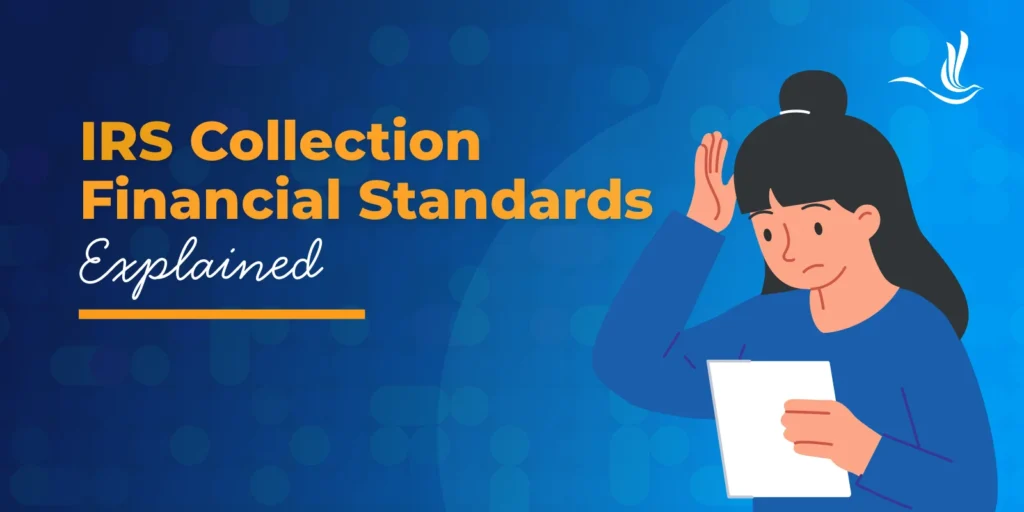
If you’ve ever had to deal with the IRS, you’ll probably agree that one of the most puzzling concepts is the IRS Collection Financial Standards. These standards play a crucial role in determining a taxpayer’s ability to pay their tax debt. They can significantly influence the outcome of negotiations with the IRS. In this article, we’ll break down what the IRS Collection Financial Standards are, how they are used, and what taxpayers need to know when dealing with them.
Understanding the IRS Collection Financial Standards
The IRS Collection Financial Standards are a set of guidelines used by the IRS. They help evaluate a taxpayer’s ability to pay their outstanding tax liabilities. These standards establish allowable living expenses (ALEs) for taxpayers based on their household size and location. The standards cover various categories of expenses, including food, clothing, housing, transportation, and out-of-pocket health care expenses.
The standards are derived from national and regional data on average costs for basic necessities. They provide a framework for the IRS to assess a taxpayer’s financial situation. Then, they determine a reasonable amount that the taxpayer can afford to pay towards their tax debt each month. For example, a family of three is allowed the following expenses per month:
- $977 for food
- $83 for housekeeping supplies
- $187 for apparel and services
- $87 for personal care products and services
- $343 for miscellaneous expenses
Housing allowable expenses are based on local standards. For example, a family of three living in Orange County, California is allowed housing expenses of $3,851 per month. On the other hand, a family of three living in Clarke County, Alabama is allowed housing expenses of $1,821 per month.
How the IRS Uses the Standards
When a taxpayer owes back taxes to the IRS, the agency may initiate collection actions to recover the debt. As part of this process, the IRS will conduct a financial analysis of the taxpayer’s situation to determine their ability to pay. The IRS Collection Financial Standards serve as a benchmark for evaluating the taxpayer’s expenses . They use these to determine what portion of their income can be allocated towards repaying the tax debt.
If the taxpayer’s expenses exceed the amounts allowed by the standards, the IRS may challenge certain expenses. Alternatively, they may request additional documentation to justify them. For example, if a taxpayer claims higher-than-average housing expenses, the IRS may ask for proof of rent or mortgage payments.
Negotiating with the IRS
Taxpayers who are unable to pay their full tax debt may have options for negotiating a more manageable payment. Understanding the IRS Collection Financial Standards can be beneficial during these negotiations, as taxpayers can use the standards to support their case for lower monthly payments.
For example, if a taxpayer’s actual expenses exceed the amounts allowed by the standards, they can provide documentation to demonstrate the necessity of these expenses. This documentation may include receipts, bills, or other supporting evidence.
It’s essential for taxpayers to be prepared and organized when negotiating with the IRS. Having a clear understanding of their financial situation, including their income, expenses, and assets, can strengthen their position and increase the likelihood of reaching a favorable agreement with the IRS. But keep in mind that just because a taxpayer is used to paying a large amount of living expenses, does not mean that the IRS is willing to accept this. In other words, the IRS will not always allow expenses that exceed their Collection Financial Standards.
Six Year Rule for Repayment of Tax Liability
As mentioned, in some cases, your expenses may exceed the IRS Collection Financial Standards. There is a six-year rule that allows you to pay these expenses if your tax liability, including penalties and interest, can be paid in full within six years, or before the Collection Statute of Limitations ends. If you can’t pay within six years, the IRS may allow you to take a year to pay off or change some expenses that exceed the standards.
Tax Help for Those Who Owe
The IRS Collection Financial Standards play a significant role in determining a taxpayer’s ability to pay their tax debt. By understanding how these standards are used and knowing their rights during the negotiation process, taxpayers can better navigate their interactions with the IRS and work towards resolving their tax issues effectively. Seeking professional assistance from tax professionals or enrolled agents can also be valuable in navigating complex tax situations and achieving the best possible outcome. Optima Tax Relief is the nation’s leading tax resolution firm with over $3 billion in resolved tax liabilities.
If You Need Tax Help, Contact Us Today for a Free Consultation